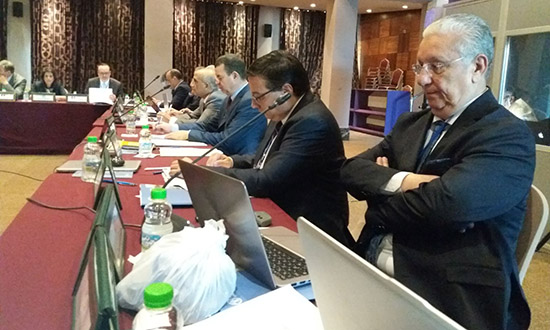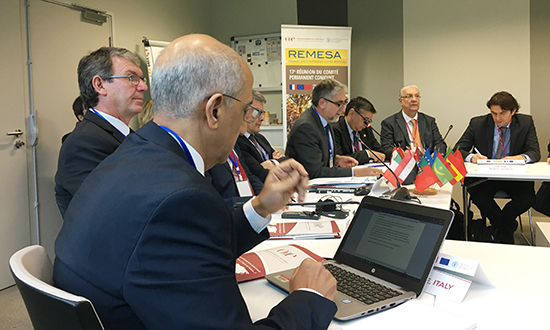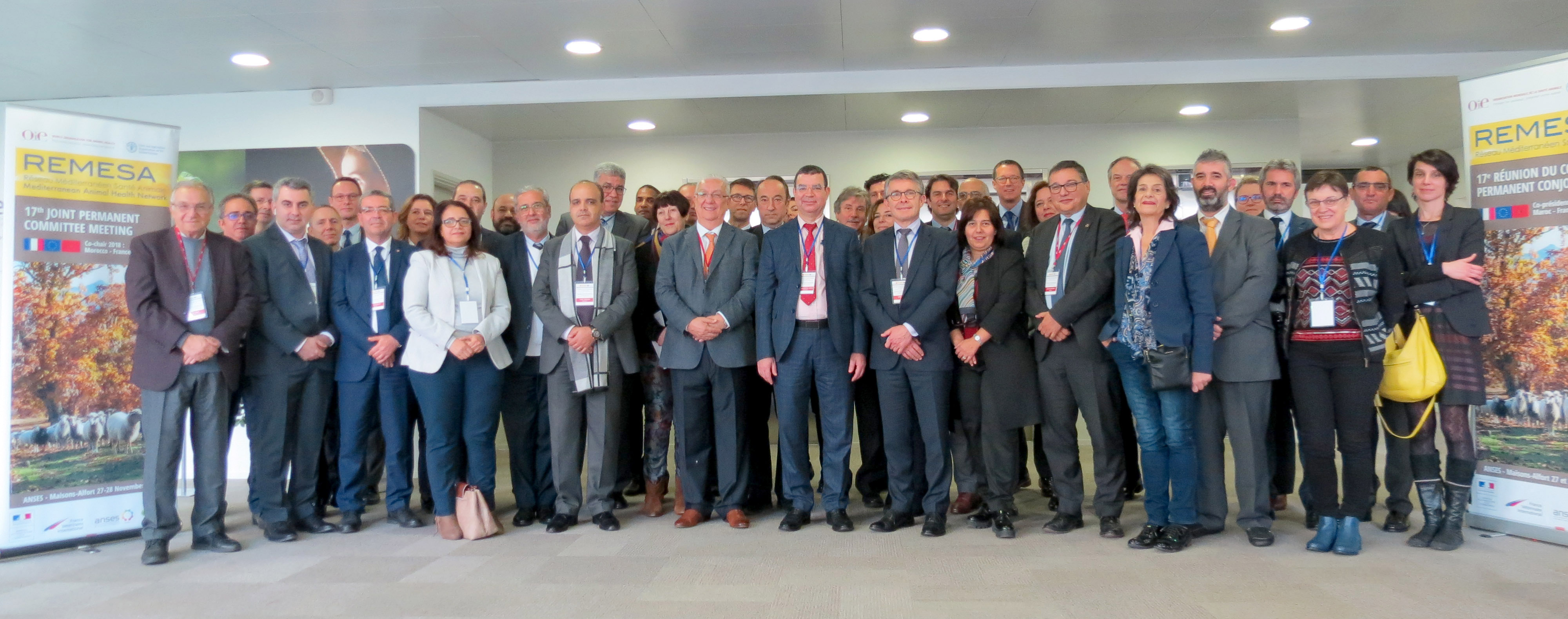
Under the auspice of the co-presidency of France and Morocco – the Joint OIE and FAO secretariat (based in Tunis) – organised in collaboration with the Ministry of Agriculture and Food of France (through its “Direction Générale de l’Alimentation – DGAL”) the 17th meeting of the REMESA Joint Permanent Committee that was held in Paris (France) on 27-28 November 2018.
The meeting was attended by about 60 people including the Chief Veterinary Officers of REMESA member countries or their representatives from Algeria, Egypt, France, Italy, Lebanon, Morocco, Spain, Greece, Tunisia, Mauritania, Cyprus and Malta. The representative from the European Commission (Dr Moritz Klemm – DG SANTE), the representative of Union Maghreb Arab (Ms Faouzia CHAKIRI BOULOUIZ – UMA) as well as the President of EuFMD (Dr Jean Luc Angot) also participated in the meeting making available their contribution. Additional institutions/organisations were asked to participate in the meeting for providing specific inputs [French Agency for Food, Environmental and Occupational Health & Safety (ANSES), the French Agricultural Research Centre for International Development (CIRAD), the National School of Veterinary Services (ENSV), the National Agency for Veterinary Medicinal Products (ANMV), the Global FAO-OIE PPR Secretariat, the Emergency Management Centre for Animal Health (EMC-AH), the Istituto Zooprofilattico Sperimentale dell’Abruzzo e del Molise, Italy (IZSAM) and the European Federation for Animal Health and Sanitary Security (FESSAS)].
The meeting was co-chaired by Dr Loïc Evain (Chief Veterinary Officer of France and OIE delegate) and Dr Abderrahman El Abrak (Chief Veterinary Officer of Morocco and OIE delegate). Dr Roger Genet (Director General of ANSES) and Dr Patrick Dehaumont (Directeur général de l’Alimentation du Ministère de l’agriculture et de l’alimentation de France) welcomed the participants and officially opened the meeting by addressing the audience with some key messages. Dr Genet, reminded the missions of ANSES including the new international mandate as the European Union Reference Laboratory for foot-and-mouth disease (FMD) jointly with SCIENSANO from Belgium. This new European reference mandate will come into effect on 1 January 2019. He stated that, within the overall mandate of ANSES, animal health plays a significant role especially in the framework of “One Health” approach. In particular, it was mentioned the activities in the framework of food safety and Veterinary Medicinal Products by reminding the activities of the OIE collaborating Centres based at ANSES such as the one for Veterinary Medicinal Products. Dr Dehaumont, reiterated the support of France of this REMESA network that represents a good example of collaboration between countries on activities related to animal health and in particular to priority diseases such as Avian Influenza, FMD and PPR. Globalisation, climate changes and change in agricultural systems are elements that justify and reinforce such cooperation. He reminded the new EU legislation on animal health that will come into effect in 2021 and that will give particular attention to the prevention of vector-borne diseases. France recognises the importance of the animal movements in controlling animal diseases and, therefore, decided to organise – during the REMESA JPC meeting – a parallel event about this topic and, more in general, on the importance of epidemiological surveillance. This event was managed by CIRAD in collaboration with North African countries (Algeria, Tunisia and Morocco). The results of that meeting were shared with the REMESA audience. Finally, Dr Dehaumont highlighted the importance of identifying the needs for research in the Mediterranean area by involving all the actors that could play a role and obtain related benefits.
Dr El Abrak (CVO of Morocco), stated that REMESA plays a primary role in controlling animal diseases and that this network was created thanks to the willingness of countries to cooperate. Today, the Mediterranean region is experiencing multiple sanitary risks also in relation to the changes of the ecosystems that allow the establishments and proliferation of vectors able to transmit diseases with social and economic impact. Therefore, REMESA remains the ideal framework where addressing these issues.
Dr Evain (CVO of France), also emphasised the importance of REMESA network and welcomed the new elements inserted in the agenda – in addition to the traditional ones – such as “methods and tools on surveillance” and a session on “Governance & Strategy” to discuss the future of REMESA after ten years of activities. He also introduced the working programme of the two-days meeting including the cultural and scientific visit of ANSES Laboratory.
The representative of the FAO, Dr Ahmed El Idrissi (Senior Animal Health Officer) – while thanking France and ANSES – also addressed the opening messages to the audience. He reiterated the support of FAO to REMESA who demonstrated to be a successful model for sharing information between countries. It is imperative to consolidate such platform and ensure its durability over time and make more dynamic the interactions with other relevant initiatives/partners (e.g. GF-TADs, EMC-AH, Tripartite…) and research institutions.
The Deputy Director General of the OIE, Dr Jean-Philippe Dop, also welcomed the participants and thanked France and ANSES for the organisation of the meeting by reminding the close partnership between ANSES and OIE through its OIE collaborating Centres. He mentioned the importance for REMESA to incorporate research projects activities occurring in the Mediterranean area such as “ERFAN” and “MediLabSecure” because this network (REMESA) can become a coordination platform for the benefit of resources optimisation and results dissemination. He also stressed the potential interest for REMESA of being labelled under the GF-TADs umbrella. He recognised the positive results obtained by the introduction in the REMESA agenda of horizontal topics such as “trade” that is stimulating to discuss between countries about concrete commercial barriers in view of finding solutions.
Discussions and major conclusions of the two-days meeting are as follows:
The next co-presidency for 2019 will be ensured by Egypt and Cyprus.


